Most people will experiment with alcohol at some point in their lives and face little to no consequences for their actions. Unfortunately, there are also many people whose drinking habits can have a serious toll on their lives. Often, people will seek out answers for themselves or a loved one to find out how to stop drinking alcohol.
If you struggle with drinking, it is important for you to know how to safely stop your alcohol use and stay sober in the long term. Due to how tricky recovery from alcohol can be, seeking professional help will be your best bet to achieving lasting sobriety.
At Royal Life Centers, we can help you safely and successfully stop drinking alcohol.
When Does Drinking Become a Problem?
In the U.S., drinking alcohol is considered to be perfectly normal and often even encouraged in many situations. When we find ourselves in social situations or celebrating an achievement, having a drink or two is, in most cases, perfectly normal.
So, when does drinking become a problem? While there is no one-size-fits-all answer to this question, as what constitutes problem drinking can vary from person to person, there are some general signs that your drinking may be problematic.
Signs of problematic drinking including:
- Finding yourself often drinking more than you intended.
- Feeling the need to drink to cope with stress or difficult emotions.
- Having blackouts or memory loss after drinking.
- Getting into trouble at work, school, or home because of drinking.
- Having health problems related to drinking, such as liver damage or heart disease.
- Having problems with relationships because of drinking.
- Feeling like you can’t control your drinking.
If you recognize the signs of alcohol abuse in yourself or a loved one, it’s important to act quickly. Most people don’t realize how destructive their relationship with alcohol is until it’s already damaging their lives in major ways. Even if your loved one hasn’t asked for help yet, there are beneficial ways you can approach the topic of seeking treatment and starting down a path of recovery.
How To Speak To A Loved One About Their Drinking Habits
When speaking to a loved one about their drinking habits, go in with love and compassion for their situation. It is important to be understanding of the individual’s feelings, as addiction can be an incredibly sensitive topic. Let them know that you are there to support them on their journey to sobriety and recovery.
Encourage your loved one to reach out for professional help; if they feel overwhelmed or resistant, suggest attending a support group or seeing a therapist. Focusing on your loved one’s health and well-being, instead of the drinking itself, will be more effective in guiding them to recovery.
With that being said, it’s important to understand why people struggle to stop drinking. Seeking out resources to better understand those struggling with addiction can help you support your loved one on their journey to recovery.
Why Do People Struggle to Stop Drinking?
In most cases, people don’t start abusing alcohol without reason. For many people who struggle with drinking, there are certain factors contributing to their problem.
Some of the most common contributors to alcohol abuse include:
- Mental health problems
- Chronic pain
- Financial stress
- Familial or personal history of substance abuse
Due to the way in which alcohol affects the mind and body, it can be difficult to know when you have crossed the threshold between a normal and overindulgent amount of alcohol. According to the CDC, there are two main forms of alcohol misuse which include heavy drinking and binge drinking.
Binge drinking, the most common form of excessive drinking, is defined as having:
- 4 or more drinks on a single occasion for women
- 5 or more drinks on a single occasion for men
Heavy drinking is defined as having:
- 8 or more drinks per week for women
- 15 or more drinks per week for men
Generally, a safe amount of alcohol is considered to be no more than one standard drink on a single occasion for women and no more than two standard beverages for men. If you find that you are often exceeding this amount, it may be a sign of a bigger problem.
What Are the Signs and Symptoms of Alcohol Abuse?
Now that you know what problem drinking looks like, it is important to learn how to recognize the signs of an alcohol use disorder. While the signs and symptoms of alcohol abuse can vary from person to person, some of the most common ones include:
- Not being able to control or stop drinking once you have started.
- Needing to drink more to get the same effect.
- Spending a lot of time drinking or recovering from drinking.
- Making excuses for or lying about your drinking.
- Giving up activities you used to enjoy because of drinking.
- Having problems at work, home, or school because of drinking.
- Getting into legal trouble because of drinking.
- Damaging your relationships because of drinking.
- Experiencing physical or mental health problems because of drinking.
If you are concerned that you or someone you know may have a problem with alcohol, it is important to seek help. At Royal Life Centers, we offer the support and resources you need to regain a healthy, sober lifestyle.
Reach Out for Help With Alcohol Abuse
Are you struggling with alcohol abuse?
Royal Life Centers at Chapter 5 is here to help you recover. Because we care.
Tips for How to Stop Drinking Alcohol
There are several ways that you can start making better choices when it comes to your drinking habits. You can start by limiting your intake and asking trusted people around you to help you stay accountable for your recovery. Practicing mindfulness, exercising, and finding other ways to manage stress can also help ease your need to reach for the closest drink.
Of course, it is important to keep in mind that if you are looking for tips on how to stop drinking, home remedies are generally not your best bet. Alcohol addiction is a very serious disease that can have severe side effects on your physical and mental health.
The first thing you should do when you decide to stop drinking is seek professional help. Participating in an addiction treatment program can help you get the physical and emotional support you need to achieve long-term recovery from substance abuse. It can also help to build a healthy support system, whether this be with family members, friends, or recovery support groups like Alcoholics Anonymous (AA) and other programs.
Most importantly, you need to be patient and forgiving with yourself. Recovering from an alcohol addiction is not easy, and many people will face setbacks along the way. It is okay to slip up and make mistakes, so long as you remember to pick yourself up and keep moving forward.
The Benefits of Alcohol Treatment
If you are wondering what happens when you stop drinking, there is no easy answer to this question. For many people who struggle with alcohol abuse, their bodies will have become physically dependent on this substance. That means that if they suddenly stop drinking alcohol, their body can go into shock, causing severe and potentially life-threatening withdrawal symptoms.
With this in mind, there are many benefits to seeking professional alcohol treatment. One of the biggest pros of receiving treatment for alcohol addiction is that this will help manage any co-occurring physical or mental health problems you may be experiencing as a result of your drinking.
Alcohol abuse can lead to a variety of health problems, including liver disease, heart disease, cancer, and mental health issues. Professional treatment providers can address these issues alongside your substance abuse.
Getting professional help can also give you the tools and support you need to repair relationships strained by your alcohol abuse. As you work on your substance abuse, you will be able to improve your communication and problem-solving skills, allowing you to resolve any conflicts with your family or friends in a healthy and effective way.
Addiction treatment services can help you improve your self-esteem and reduce your risk of relapse. The recovery process from alcohol use disorders can be challenging, and people struggle to fight the urge to drink and revert back to their past habits when things get hard. Having professional support can help you navigate recovery from alcohol addiction and stay on track with your recovery.
Learn How to Stop Drinking in Alcohol Treatment at Chapter 5
Understanding how to stop drinking alcohol is the beginning of a recovery journey. It is important to recognize that there are many different paths to sobriety and it is important to find the right one for you. Toward that end, Chapter 5 Recovery provides an array of evidence-based services and programs designed to help men in their journey from active addiction into lasting recovery.
Our comprehensive approach includes:
- Individualized treatment plans
- Gender-specific treatment
- Evidence-based behavioral therapies
- Addiction and mental health education
- Peer support groups
- 12-step programs
- Community reinforcement
- Aftercare programs
- Alumni services
We know that lasting recovery is a process, not an event, so our goal is to help you find the best way forward for yourself. Our team of professionals is here to provide support and guidance as you travel on your own path toward sobriety. You have already taken the first step, now let us help you find the perfect treatment plan for your individual needs.
Alcohol Abuse Treatment at Royal Life Centers
At Royal Life Centers, we believe that everyone deserves the chance to live a happy, addiction-free life. Our addiction treatment program offers the comprehensive and effective treatment you need to overcome alcohol abuse and achieve long-term sobriety.
When you participate in treatment at Royal Life Centers, you will have access to a full continuum of care, including services such as:
- Medical detoxification programs provide 24/7 supervision and medical care as your body withdraws from alcohol. Alcohol detox programs can involve taking medication to stop drinking, nutritional counseling, and various other services.
- Residential treatment involves constant access to recovery tools, support, and resources such as therapy and counseling, medication, life skills training, and various other services.
- Partial hospitalization programs (PHP) provide a transitionary step from inpatient care to outpatient care. Our program incorporates intensive addiction treatment services without requiring you to live at our facility full-time.
- Intensive outpatient programs (IOP) are similar to PHP but require less attendance to allow more time for responsibilities outside of the facility such as work.
- Outpatient programs (OP) can provide you with continued support and monitoring to help you stay sober even after you leave our treatment facility.
While each guest’s substance abuse and mental health treatment process will look different, our programs offer the support and extensive treatment options needed to address every aspect of your addiction. If you are ready to begin your recovery journey, reach out to us at 877-RECOVERY to learn more about how our program can help you today!













